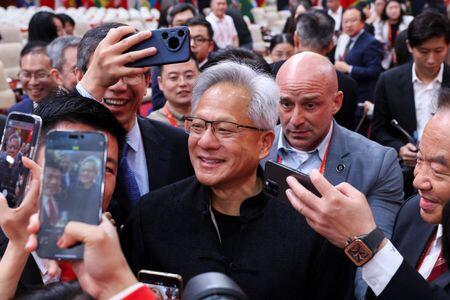Trump Signals Shift: New Stance on Nvidia Chip Exports to China

US President Donald Trump has indicated a willingness to permit Nvidia Corp. to sell a scaled-back iteration of its most advanced artificial intelligence (AI) chips, known as Blackwell, to China. During a briefing with reporters, Trump stated he would consider a deal that would allow Nvidia to ship these chips if they were designed to be less powerful, suggesting a reduction of “30% to 50% off of it.” This potential agreement reflects Trump's ongoing strategy to secure financial returns for the United States through trade concessions, an approach that some experts fear could set an unprecedented and potentially problematic precedent for American companies operating in China, while also undermining the national security justification for export controls.
This new proposal for Blackwell chips follows an unusual, separate agreement already brokered with Nvidia and Advanced Micro Devices (AMD). Under this deal, both companies have agreed to pay 15% of the revenue generated from their sales of less-advanced AI chips to the US government in exchange for export licenses to China. Specifically, Nvidia's H20 AI chip and AMD's MI308 chip are covered by this arrangement. While Trump initially sought a 20% cut for the H20 sales, he ultimately settled for 15% after negotiations, describing the H20 chip as “obsolete” and claiming China already possessed it in a different form. Despite this, the H20 was vital for Nvidia to maintain access to the Chinese market after earlier export bans.
The revenue-sharing model highlights Trump's consistent effort to engineer a financial payout for America in return for trade concessions. This aligns with arguments from Nvidia CEO Jensen Huang, who has contended that restricting sales of American AI chips could be detrimental to US national security by compelling Chinese developers to create their own alternatives, thus undermining US leadership. The administration's shift is viewed by some as an acknowledgment that China's AI advancements are inevitable, and that it may be more advantageous for American companies to benefit from this market rather than forcing China to pursue alternative or illicit acquisition channels. This approach could also generate billions in revenue for the US government.
For Nvidia, the Chinese market represented approximately 13% of its sales in 2024. Previous restrictions, such as the April ban on H20 chips to China, resulted in billions of dollars in lost revenue for the company. The current deal, even with the 15% revenue cut, allows Nvidia to resume shipments of its H20 chips, potentially recovering significant lost revenue. Combined, Nvidia and AMD could collectively earn up to $35 billion annually from H20 and MI308 sales in China, which could translate to around $5 billion in annual revenue for the White House. The broader context includes Trump's recent criticisms of chipmakers and threats of 100% tariffs on imported chips, although such tariffs are expected to affect few companies already covered by existing investments or trade agreements. The prospect of an
You may also like...
Changing Cultures: How Africa Sips It's Alcohol

Discover which countries sip the most alcohol in Africa, and the health impacts this could have on the long run.
SEC Confirms Ripple's Victory: Legal Battle Concludes as Fundraising Greenlit!

The U.S. Securities and Exchange Commission has concluded its lengthy legal battle with Ripple, issuing a critical waive...
Legal Firestorm: South Korean Ex-President's Wife Targeted in High-Stakes Arrest Warrant

South Korean investigators have secured an arrest warrant for Kim Keon Hee, the wife of jailed former President Yoon Suk...
ASEAN-Brokered Breakthrough: Thailand & Cambodia Edge Closer to Historic Border Deal

Thailand and Cambodia engaged in high-level talks in Malaysia, initiated by ASEAN, to address escalating border tensions...
Kenya's Central Bank Slashes Key Rate to 9.5%: Economic Impact Looms

Kenya's Central Bank has lowered its benchmark rate to 9.50 percent, continuing its policy to stimulate economic activit...
Is Humanity Trading Connection for AI Comfort? A Deep Dive

As individuals increasingly turn to AI for emotional support, questions arise about the erosion of human connection. Thi...
Local Tragedy: Hotel Under Construction Collapses in Edo, Claims Owner's Life

A hotel under construction in Uromi, Benin City, collapsed, tragically killing its owner, Andrew Isesere. Eyewitnesses a...
Naked Gun Remake Delivers Laughs, Neeson & Anderson's Chemistry Wows!

This season's film releases offer a diverse lineup, highlighted by the highly successful "The Naked Gun" remake, starrin...




